“A new sonic playground” :: Works Progress Administration interview (Glen Phillips)
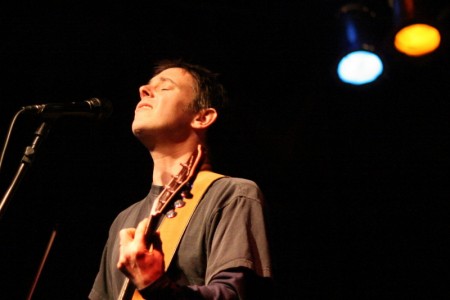
One snowy Sunday night in October, I sat at my kitchen table after tucking my little one into bed and realized that Glen Phillips of Toad The Wet Sprocket was playing at that very moment right up the road with his new band Works Progress Administration, and I had completely missed it. After listening to their bluegrass-laced toe-tapping goodness, I started looking up other tourdates and noticed they were playing in December in Nashville, where a dear friend lives. And thus, this edition of musical adventure was born.
Works Progress Administration is an expandable collective, centered around the songwriting skills of Glen Phillips, Sean Watkins of Nickel Creek, and Luke Bulla of Lyle Lovett’s Large Band. In various incarnations live and on the album, they are fleshed out with folks from other bands like Soul Coughing, Elvis Costello’s Imposters, and Tom Petty’s Heartbreakers. They were playing at the storied Exit/In in Nashville, and I arranged to interview Glen and his new bandmates. To say this was a big deal for me would be an understatement.
I have loved Toad for more than half my life, and with my entire heart. They were one of the first bands I really claimed as my own during young adulthood, and whose perfect songwriting (“Windmills,” anyone?) has taught me so much and fortified more parts of me than I can count. I am a Toad-saturated girl, through and through. I once wrote, “listening this afternoon to toad the wet sprocket does many things for and to my psyche. the first sensation is definitely a heady and pleasant one, loaded with a thousand really good memories and the fierce scent of youth and optimism.” I still feel those things when I hear Glen’s distinctive, earnest voice on any of his current solo projects and collaborations. I was curious to talk to Glen and learn more about how his songwriting has shifted over the years, where his musical interests are taking him, and what he hopes to accomplish next.
I got all that and more when Glen and I sat down with his bandmates Sean Watkins and Luke Bulla after soundcheck one December afternoon. It was one of the most fascinating discussions about music I’ve had in a long time.
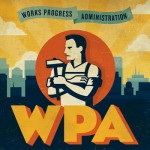 WORKS PROGRESS ADMINISTRATION INTERVIEW
WORKS PROGRESS ADMINISTRATION INTERVIEW
F/F: I am a longtime fan of Toad the Wet Sprocket and also your solo work, Glen, and one thing I’ve always admired is the songcraft behind your music. As a collective I know you all contributed to this album, and I’m wondering if the songwriting process changes. Since we’re in Nashville, Dolly Parton once said, “Writing songs is my private time with God.” Are you each still working personally and privately on writing your songs, or is it more of a collective effort now?
Glen: Most of the songs came in complete from each of the songwriters – we knew we were doing the album and we just saved up things that we thought would work for the group. There was one co-write that Luke and I did (“Cry For You”) but that was the only actual co-write on the record. And that was a very natural collaboration, like, “I’ve got this idea, let’s play with it.”
There’s a certain way of writing when the songs are for a group like there, where I’d say the difference is mostly you can write with others’ orchestration in mind. Like the song, “Already Gone” would not be a lot of fun to sing by yourself because the whole chaos of the chorus is this three-part, Twist and Shout-style buildup. So you have the freedom to write for harmony, for a particular kind of space or texture for the band.
Sean: I love writing for projects. I didn’t write anything specifically for this album, the songs I contributed were already in place. But I love getting that opportunity to work within the constraints or capabilities of a group – a new sonic playground to aim for. It’s really fun to do that. And I’m always trying to write as much as I can since new reasons will always come up when you need songs. You can never have too many of them sitting around.
Glen: I should just say too that we got together and did this album very quickly, so the next album is really going to be based around this particular five-piece, and we are going to be writing specifically for this project. It will less anarchistic; we’ll have a much better idea of what the palette is.
F/F: There was a quote I read about the making of this album about trying in your songwriting and collaboration to leave space within the songs, rather than everyone rushing to fill up every moment of the song with their unique skill or musical strength.
Sean: Every record is different, and this record came together with a big pile of songs we already had there. So what I think gives this record its personality is the individual players, and yeah, how we did leave space for each other, and tried to see how little you can play and still make it happen. That’s not to say that people don’t step out and do “fancy” stuff every now and then, but this particular group of musicians was a delight to collaborate with.
F/F: And I think that makes it pleasing to hear as well. Sometimes with these so-called “supergroups” you get super-egos as well, where everyone’s trying to do all their noodling and their fancy drum fills and each talent they are known for that will make them stand out, and it can be overwhelming as a listener.
Glen: Yeah, there are a lot of reasons that we’ve decided that we don’t really like the term supergroup. Number one is they tend to be funded and actually be superstars of some kind, and they have a bus…things like that. We’re people with a past, but that’s about it.
F/F: Sure, and also I think supergroup implies certain things, like the term “side project.” It implies that this is not as important as your primary work, like it’s a diversion.
Glen: …and that the personalities are more important than the music. It implies a success of marketing, rather than a spirit of creativity.
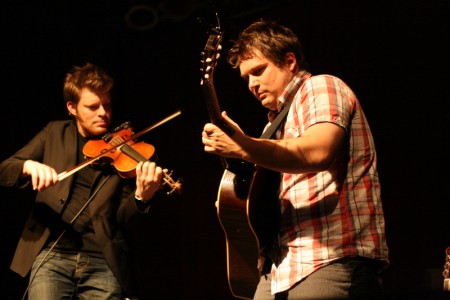
F/F: So this album was three days of rehearsal and five days of recording, and I had read a 2003 interview you did, Glen, where you talked about the overuse of ProTools and production in recording, and you said “The world does not need another Auto-Tuned, Beat-Detectived, loop-based record.” Is that how you prefer to record these days, with more of a live, organic feel?
Glen: It all depends. I also have a project called Remote Tree Children that’s Auto-Tuned and Beat-Detectived and it’s a lot of fun. The thing that I don’t like are records that try to sound like a band in a room, and then manicure it to the point where it takes all the life out of it, and there’s too many takes and too many overdubs. You wind up with something that’s supposed to sound like people playing together, but it isn’t.
I think there’s a place for using live performance and there’s a place for using the studio. I mean, Bjork is a perfect example of somebody who balances acoustic instruments and dynamic performances from electronic instruments, and really understands the balance of the synthetic and the real. Peter Gabriel also does the same thing, and LCD Soundsystem has the scratchiest guitars and the weirdest loops. So there’s a lot of room for that, but to make a record that’s really song-based, the slickness tends to detract. There’s a real beauty in going in a room and just playing a song and walking in and listening to it back, and that’s the record.
Luke: That’s what was really great about making this record, just to sit around and play these songs as a band – sitting in Sean’s living room in LA, and just working the songs out for three days. We just went in and played, and maybe later we added a few vocals and fixed a thing or two, but for the most part it’s really a live record, and the group and what we’re about and how we play together really came through.
F/F: I’m reminded of the All-Wave Recording movement championed by Kim Deal of the Breeders and producer Steve Albini (“everything should be an analog sound recording of someone playing or singing, rather than using a computer to generate or digitally manipulate sounds separated from the dimension of time in which they were performed. In short, to record All-Wave, one must use no computers, no digital recording, no auto-tuning, or any other mainstays of contemporary production.”)
Glen: I think people can tell that, though, when a record has that authenticity. In the same way that – and this is the only way in which I will ever equate these two bands – In the same way that Hootie and the Blowfish was a populist answer to everybody being really hardcore and intense and screaming all the time, when it wasn’t cool to be sensitive at all, there’s some part of people that just hungers for something as simple as “Hold My Hand.” They wanna hear something they can just relate to, they don’t want to have to be edgy all the time. I think that 30 million records was a response to this glut of overly-intense, self-important music – even though lots of it was great.
I think the White Stripes in a similar way, people were so hungry for music where the drums were obviously not being made in time, nothing was tuned, nothing was messed with, you could tell that that was rough and real, and you could tell that it was rough and real, and I think people were starving for it. Part of the reaction is the merit of the band itself, but I also think part of the reaction is that they were making a big statement against the way records had started sounding, the slippery slope everyone had gone down into artificiality.
Once again, there are people that run the line better than others, but it’s what happens with any instrument of war; you invent dynamite and then you start the Nobel Peace Prize after inventing dynamite because you think that this is going to end war and instead it just escalates it. Every time a tool like this gets invented to help make music better, the tool takes over for a while and there are different periods of recovery, and I think we’re just starting to recover from Auto-Tune.
F/F: And of course the live music experience is an opportunity for you to really connect with fans, without any of the trappings or tricks.
Glen: Yes, there are bands that are incredibly technological and also absolutely awesome live. They understand making a show and what to leave raw, like MGMT is a great example – they’re very technical, but also know when to leave things raw. I think there’s a lot that’s been done on very manicured records, and now people are striving to find a happy medium.
There was a period, I think, when bands were getting signed very young with great demos, and people got burned a lot live. But I think people went to a lot of shows where they’d heard a record that sounded great and they got there and the band couldn’t play live. That’s one nice thing about the contracting of the music industry, and I think bands that can’t play aren’t getting signed as much anymore. Everybody knows you have to bring it live, or it’s not going to work.
F/F: I feel like technology has helped spread live fan recordings as a way of creating a buzz about a band. Going back to my own history, I was on a Toad the Wet Sprocket list when I was in high school and we would swap compilation tapes from live moments of tours, best-of collections of fan recordings, in a way that I never saw done before the internet came into play for the superfans. Now sites like Live Music Archive or Wolfgang’s Vault help people know if the band has the chops and emotional energy to be worth your time live.
Sean: I’m just grateful that we have that one thing as musicians that can’t be taken away from us, that ability to go out on the road and connect with people live. I think that’s always secure.
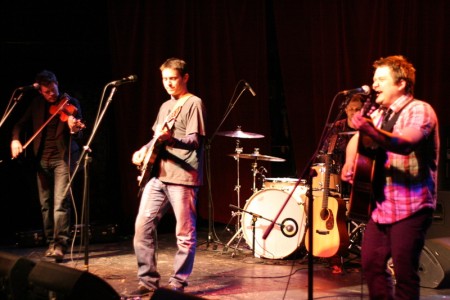
F/F: Each of you come from your own distinguished backgrounds and unique fan bases. Are you finding that the people coming out to your shows are coming from a familiarity with one of your previous efforts, or are you converting brand new fans?
Luke: Well, it seems a little different each time. Audiences have been very supportive, there’s been a little radio play, but mostly it’s extremely grassroots, very word-of-mouth. It’s been a learning curve for us to learn how to present it is and where it came from and what we’re trying to do.
F/F: It seems like a dynamic period for you guys as musicians.
Sean: Yeah, you try to make the most of what fans you have from previous incarnations, but you also really want to bring in new people, that’s the best way. And the only way to do that is often to play shows, and then go back and play again, and it’s nice to see as you go along to see new faces and more people coming in. And you hope that people that might have known about one of your bands will come and bring a friend. It’s exciting. In bluegrass and folk circles that I come from, people are pretty diligent about following their favorite musicians in whatever they do.
Glen: It’s been interesting, I lost a lot of people by not being very “rock” after Toad, but even now seeing people write things like, “Oh, well, I didn’t know about bluegrass….but I went to the show and it was awesome.” I mean, it’s interesting to see where people’s prejudices lie. I’ve kind of compared it to – if all you’d heard of rock music was Creed, you might not listen to rock music.
Most people have heard very little bluegrass, they don’t know the depth or the history or understand the context in which to appreciate it. Even to the degree where a band like Nickel Creek, which is very much not a bluegrass band but from a bluegrass background, fans will lump everything together. So it’s been very interesting to hopefully give people an opportunity to confront their prejudices and get turned onto something new and realize they might like it.
F/F: Is it a big leap from pop to rock to bluegrass? How have you crossed it, not coming from the same background as, say, Sean?
Glen: I don’t think that there’s anything to cross. I think songs are songs, and you can take a song like “Bohemian Rhapsody” and do the Weird Al polka version of it (ed: or this, which Glen showed me on his iPhone later that night). Genre has a certain reach, but I think it’s a limited one. We made this album because we wanted to play songs together that we love, as well as we can with the personnel we have.
We have one or two things in the live set that lean towards bluegrass, but there are also things that would be completely wrong for a bluegrass show, like we have an electric guitar, and a drummer, and an electric bass instead of an upright bass, so we’re screwing everything up there. And on the record there’s pedal steel and piano, which have no place in bluegrass at all. So, I occasionally have heard criticisms of the band, “Oh, it’ll be interesting to hear what happens when you guys find your sound,” but we sound like we do because we like that variety. I hate the idea that we would someday show up and you would be able to predict what the tone of the next song would sound like because the last three songs all sounded exactly the same. That would just bore all of us to tears.
Sean: It doesn’t matter what genre it is, it just matters if the songs are good.
Glen: And I think people are becoming more accepting of that. I mean, it is the iPod generation, so many people are proud to have broad tastes, but I think people still have a hard time swallowing musicians from the iPod generation who don’t have a defined sound. I feel this pressure like, “Well, you’ve got to find out what your sound is and then stick to that, so people will know what to expect from you.” Bands like Iron & Wine, I think he’s great but I also can’t take huge doses because there’s not huge variety on his albums. It’s a great place to go, but people seem to have less expectation that you will adhere to a pre-existing genre, but more expectation that you will create your personal sound and never deviate from it.
F/F: Glen, in that same interview from 2003, you talked about your frustration with a blockage in getting music released after recording it. With this record, you guys are doing it all yourselves with no label backing, and you’re using tools on the internet like BandCamp to disseminate your music. Do you think this album could have happened in the same way ten years ago?
Sean: Well certainly the technology wasn’t there ten years ago, but there were other ways back then, like more people bought actual records
Luke: Now people just stream the record online without purchasing it.
Sean: Record sales ten years ago were huge compared to now.
Glen: It’s interesting because more people listen to more music now, but fewer people are paying for it, and at the same time, it’s easier to make records and put them out. There’s a statistic that I heard recently – back when Toad was putting out records there were maybe 20,000 records a year, and now there were 100,000 records put out this year, and supposedly only 1500 of them sold more than ten thousand copies. So you have a shrinking market with a total glut of product.
It’s interesting, I mean ten years ago it would have been different. We probably would have been able to do this record with a label, and get some more attention, and there were things about the world then that seemed more intact. You could actually put one foot in front of the other and predict what would have an effect and what wouldn’t. Radio used to sell records. It’s a strange world right now. I think in a lot of ways it is the Wild West – there’s great opportunities, but the success stories feel like unrepeatable anomalies.
****
After the interview I got to share a meal with Glen and continue our conversation (top 5 night, for sure) and their show impressed me and all of the enthusiastic Nashville crowd. There is a true joy to watching these musicians play together, and I was glad to get a chance to witness it, after hearing them talk about what they want this band to be.
All my heroes have grown up to be awesome.
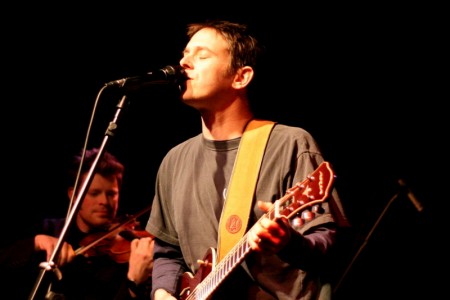
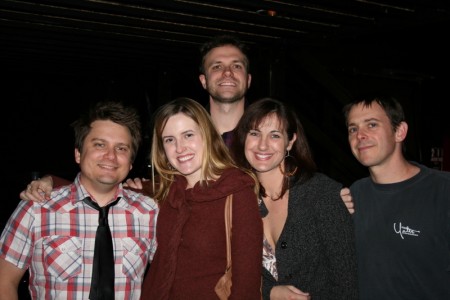
LOOK: Pictures from the show
DOWNLOAD: A free career-spanning 8 song sampler of Glen’s music



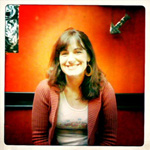 Name: Heather Browne
Name: Heather Browne
yay!
dianne — January 13, 2010 @ 7:56 am
What a great interview. I saw them play in my town a couple of months ago and loved it. I heard about them via you and World Cafe, so thanks.
Claire — January 13, 2010 @ 8:57 am
[...] January 13, 2010 Glen Philips was/is the frontman of Toad the Wet Sprocket. One of his subsequent projects is the “expandable collective” Works Progress Administration (WPA). I found out about WPA via the wonderful Heather Browne. [...]
Bandcamp, and Other Shy Shortcodes « Changing Way — January 13, 2010 @ 12:38 pm
great interview! i’m even more interested in the album now. (= thanks!
Faith — January 13, 2010 @ 2:13 pm
Great interview, Heather. If only all music journalists cared as much and knew as much about the subject of the interview.
I think I was on the same Toad list my freshman year of college! There was the tape compilation of live songs. There was a CD of an entire show at some outdoor festival. That was a big deal then, as everyone was trading tapes in 1996–not swapping CDs or mp3s. And then I recall a t-shirt too…maybe it was white with a black drawing of the flowers from the cover of Dulcinea. I could be confusing it with a poster I had. Are we talking about the same list? I don’t know what happened to the shirt, but I know I still have the CD and tape stashed away in the closet.
When I discovered that Toad listserv soon after arriving to college in the Fall of 1995, I was in heaven. Reading all these people interpret the meaning of Toad songs really deepened my appreciation of their music and helped me look deeper into the music of others as well. I think I saved and printed some of the best e-mails before I left college, but I went looking for other college e-mails a couple years ago and could find them nowhere.
It all culminated in one of my top 5 nights, when my roommate, my girlfriend, and I drove from Syracuse to see Toad play at Marist College in April 1997. My girlfriend and I first said “I love you” to each other that night. Nine years of marriage and two kids later, it’s worked out pretty well.
My heart literally sank when I heard they broke up. A decade later, I’ve continued to follow Glen. Three years ago I got his “Mr. Lemons” CD and kept it in the rotation as I stayed up all night with my newborn son. I’ll always associate “Everything But You” with that time. More recently I saw Luke play with Lyle and I really love WPA.
Sorry for the lengthy comment, but thanks for a great post!
Jeremy — January 14, 2010 @ 7:58 am
yup yup! i remember that, it sounds like the same list. I don’t think I ever got the tshirt, but I have been sleeping in my green dulcinea shirt lately
i still have cassette tapes from that era, right here under my stereo, actually. I should bust one out. i wish i could remember what that list was called…..
thanks for the wonderful comment, jeremy.
browneheather — January 14, 2010 @ 8:30 am
If only I could find the green hat I bought at that concert. It had a red oval in the middle with “toad” on it. I must have wore it everyday for two years and I don’t throw anything out, but alas, I have never been able to find it.
I’m on the case of this listserv. I did some googling and came up with a dead toad link with “prairienet” in the address. Does that sound familiar to you too?. It turns out that it’s a community information network for Champaign-Urbana housed at the University of Illinois. They don’t host listservs anymore, but they were founded in 1993. I wonder if they did that sort of thing back then.
Jeremy — January 14, 2010 @ 10:16 am
yes. that’s it. good detective work!
browneheather — January 14, 2010 @ 10:33 am
Jackpot! I love the wayback machine. It appears it had no name. There’s no mention of list archives anywhere.
http://web.archive.org/web/19990202232344/www.prairienet.org/toad/mailinglist.html
http://web.archive.org/web/19991001073911/www.prairienet.org/toad/listwelcome.html
http://web.archive.org/web/19980115153137/http://www.prairienet.org/toad/
Jeremy — January 14, 2010 @ 10:46 am
man, that is priceless stuff. the early days of my internet music-nerdicy!
browneheather — January 14, 2010 @ 10:57 am
I buddha bow to the greatness of your writing. “fortified more parts of me than I can count.” Schmoly, woman. How do you do it.
Bethany — January 15, 2010 @ 9:38 am